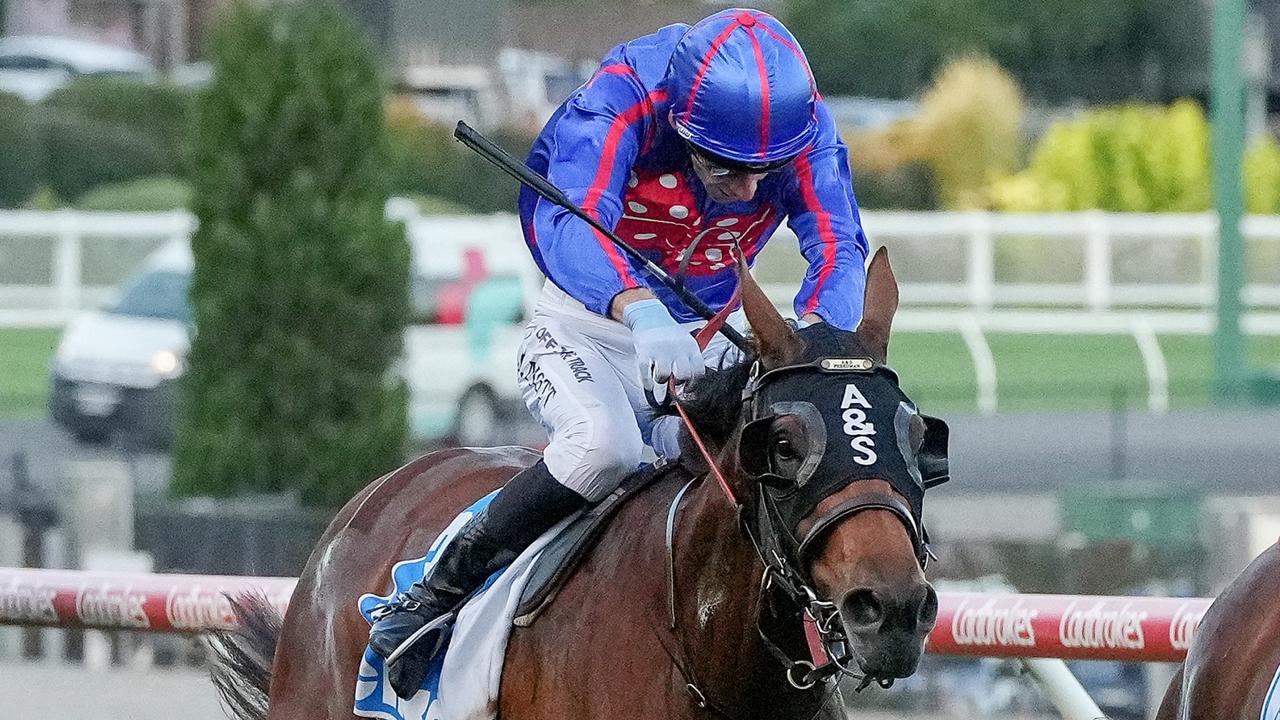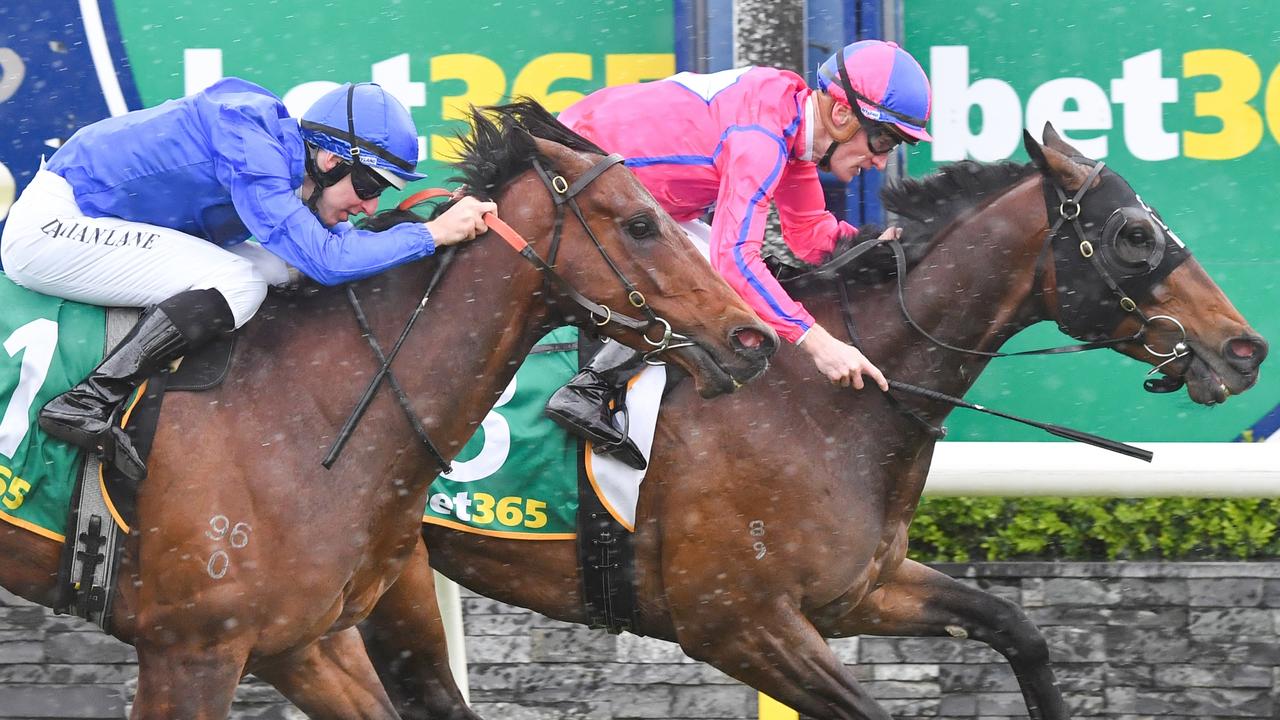Harry Coffey determined not to let crippling cystic fibrosis ruin his quest to win the Melbourne Cup
BRAVE Harry Coffey’s story is amazing tale of steely resolve and determination and he will have to be every bit of that and much more if he is to win the Melbourne Cup.
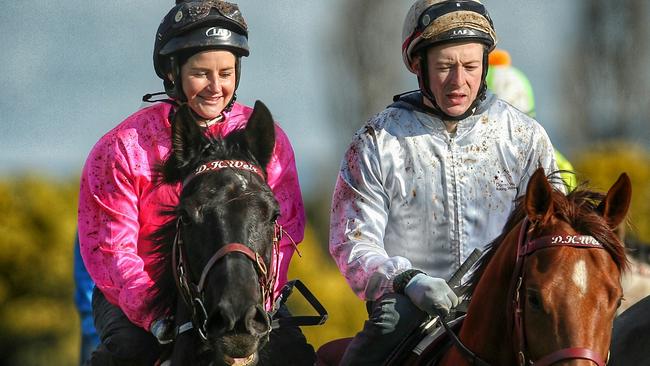
Racing
Don't miss out on the headlines from Racing. Followed categories will be added to My News.
HARRY Coffey was always small, much smaller than his younger brother Sam.
By a curse of birth, a debilitating disease that has no cure, Coffey was consigned to a life of conditions — and one of them was his little brother would also be his big brother.
When Harry was particularly small, about six or seven, he’d always accept Darren Weir’s football challenge.
Weir was a young Stawell trainer with 20 horses and the best mate of Harry’s dad Austy. Weir regularly popped by Austy’s stables at Swan Hill, an hour or so from Weir’s hometown of Berriwillock.
Weir could “play a bit back then’’ and would boot the footy into the heavens and stump up $20 if the tiny kid with the constant cough could catch it.
HOT TIPS: WEEKEND BEST BETS
BEAT THE BOOKIE: VALUE BETS
SPORTSMAN PREVIEW: CAULFIELD
THE EARLY OIL: CAULFIELD
ANALYSIS: MEMSIE STAKES
The steely resolve, as young Harry positioned himself under that ball, was not there at birth.
It was instilled in him by parents who refused to allow Harry’s crippling cystic fibrosis determine his life course.
Coffey had learned early to back himself in against the odds and when Weiry sent that ball into the skies, Harry would always catch it.
The $20 would parlay into $50, then $100.
Harry would cough, a curse of the disease, but Weir would never cough up, instead issuing endless IOUs that are yet to be honoured.
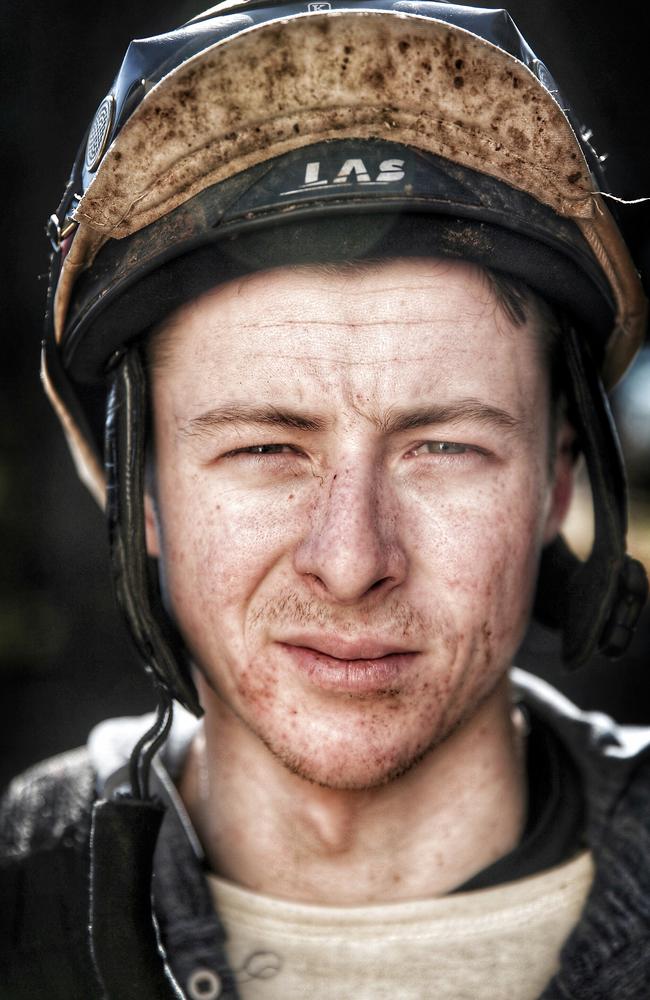
Fifteen years on, Weir has set Coffey another challenge — to win the Melbourne Cup on Signoff.
Victory would provide Weir with his second Cup in a row and racing — and the world beyond it — with a second consecutive fairytale on the first Tuesday in November.
A year ago, Michelle Payne smashed through racing’s last glass ceiling on Prince Of Penzance to become the first female to ride the winner.
If Coffey can win the Melbourne Cup, the message would reach every bit as far, probably further, into homes, hearts and hospital wards.
Coffey must go both the distance, the gruelling two miles, and stay the journey.
From today, there are 65 days to the Cup.
To grasp the magnitude of Coffey’s quest to win the Melbourne Cup — to ride at all, let alone ride in it — you must grasp the nature of the disease.
Cystic fibrosis damages the lungs and inhibits breathing.
The lungs bleed. Sufferers are prone to infection and lethargy. They require constant hospital visits, week-long tune-ups, self-medication of drips.
It can be held at bay, then strike without notice. It is a terrible disease for anyone, but unimaginable for a jockey on a Melbourne Cup mission.
Coffey said he had never known any different, so didn’t feel it had held him back.
“It’s my normal,’’ he said, adding the scenario for sufferers was not as bleak now.
“When I was born my parents were told I might not make it to 20. Now they (sufferers) can live until they’re 70,” he said.
“There’s no cure but I reckon they will work it out.
“People say to me, ‘It’ll eventually stop you’, but that’s not how I see it.
“Maybe that’s just me. The only way it will stop me is if I go downhill real quick and can’t get my strength and fitness back.”
As a kid Coffey would spend up to 10 days at a time in the Royal Children’s Hospital for what he described as a grease and oil change, a tune-up.
If he started to feel fatigued, he’d pack his toothbrush. Protein and antibiotics would be pumped into him.
The visits are less regular now. He might spend a week or so in The Alfred once or twice a year, then spend the same time at home in Swan Hill, self-administering antibiotics through a drip six times a day for a week, setting his alarm to pump himself with antibiotics in the middle of the night.
Coffey’s mother Maree always told him he was no different than his mates, and he believed her.
He’d hunt, camp and play footy and hold his own.
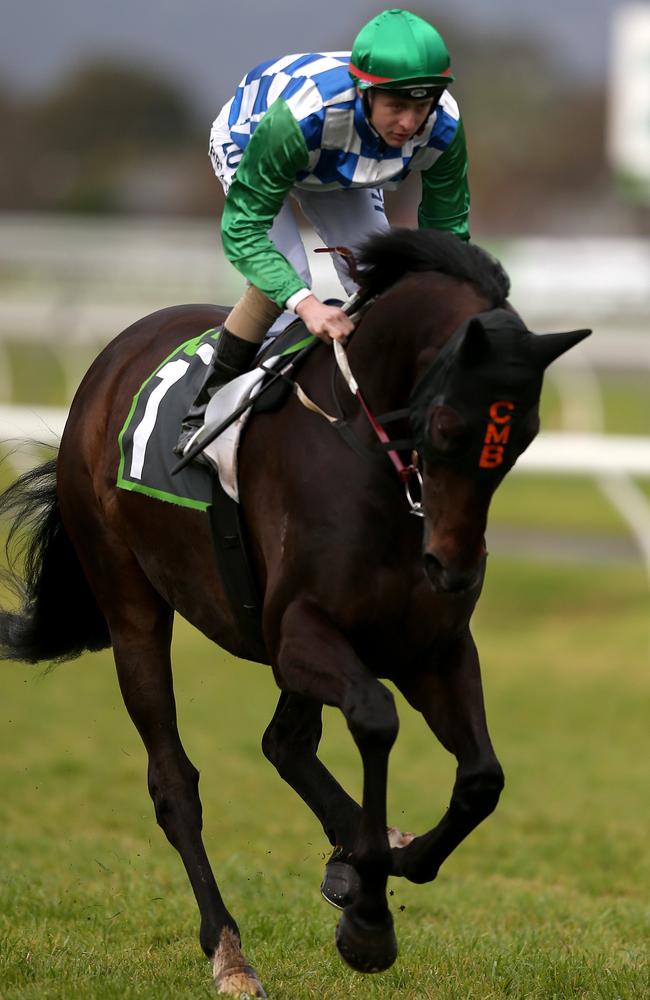
Only once, just briefly as a teenager, did Coffey curse his affliction.
“But Mum and Dad always told me there is nothing I couldn’t do,’’ he said.
He’d splutter through footy games and the water boy, not knowing his story, would gallop up with an asthma pump.
“I’d be knackered after every game, but everyone would be knackered. It was normal for me,” he said.
Coffey became a jockey, partly because of his disease, partly despite it.
“I wouldn’t have been a jockey without it,” he said.
“It made me stay light, never gave me a chance to grow. Your energy isn’t put into growing, it’s all put into fighting the disease, fighting off infection.”
Coffey calls it the “blind disease’’ because it’s hard to pick — but not impossible.
The cough is a constant. In post-race interviews after riding a winner, his breath is laboured and shallow.
He was stood down twice at the races about two years ago — once at Morphettville, once at Caulfield — after the race-club doctor noticed he was bleeding from the mouth, via the lungs.
“Your heart rate goes too fast for your lungs,” he said.
“Weaker blood vessels can break and bleed. It hasn’t happened for a couple of years, but it can hit you at any time.
“I tell them, ‘Just give me half an hour, I’ll be right’, but I guess they’ve got to think of their own job and other riders, so they stood me down.”
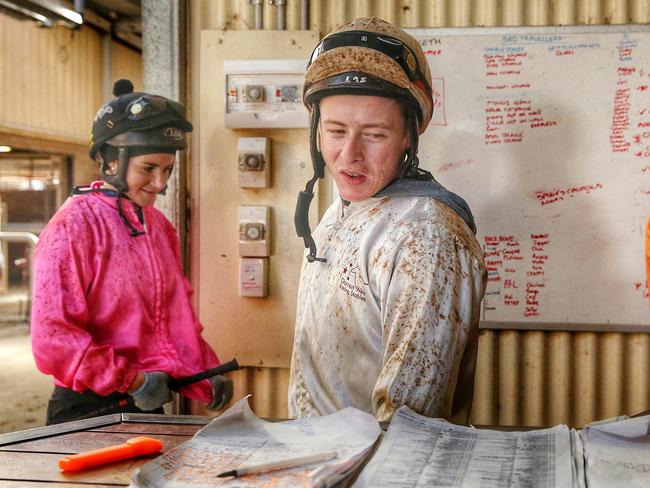
Coffey’s latest tune-up was strategic. He checked into The Alfred about six weeks ago in a bid to clear a path to the spring, and ultimately the Cup.
Coffey rides Prince Of Penzance in Saturday’s Memsie Stakes at Caulfield, but is merely warming the seat, maybe for Payne.
Weir is both trainer and dream weaver. Imagine a Cup featuring Payne and Coffey and their remarkable stories.
Coffey rode Signoff — fourth in the Cup two years ago — first-up in Adelaide, when the horse finished 11th over an unsuitable trip on a “cow paddock” of a track.
He is booked to ride Signoff right through to the Cup, but there are no guarantees, as Payne well knows.
My health can go downhill very quickly,” Coffey said.
“If I’m not the right person for the horse, I will be the first to put my hand up and say, ‘I don’t think I can do it for you’.
“But I’m going as well as ever with my health, and having the Cup as a goal is making me work harder and be fitter.’’
Coffey has never doubted he could ride, but he’s always wondered if he could ride a Melbourne Cup.
The holy grail is arguably our greatest test of endurance. Lungs burn, horse and human.
But winning the Andrew Ramsden Stakes on Weir’s Glorious Sinndar at Flemington last May, over the same course and distance as the Cup, gave him confidence.
“I instantly thought about the Melbourne Cup,” he said.
“I imagined it would have felt the same, but 100 times better. I thought I’d be buggered, but pulled up 100 per cent. I thought ‘I can do this’.”
Weir thought the same.
The trainer remembers the kid who would always catch the football, no matter how hard and high he kicked it. He has known the backstory from day one. He’s always had an eye out for Harry.
Weir is a tough task master but a realist.
He thinks about the Cup, thinks about Coffey and considers a proper measure of achievement.
“If he gets there on the day, he’s achieved enough of a bloody story in my book,” he said.
“The horse has to get there and Harry has to get there — there’s your dream right there.”
matthew.stewart@ news.com.au
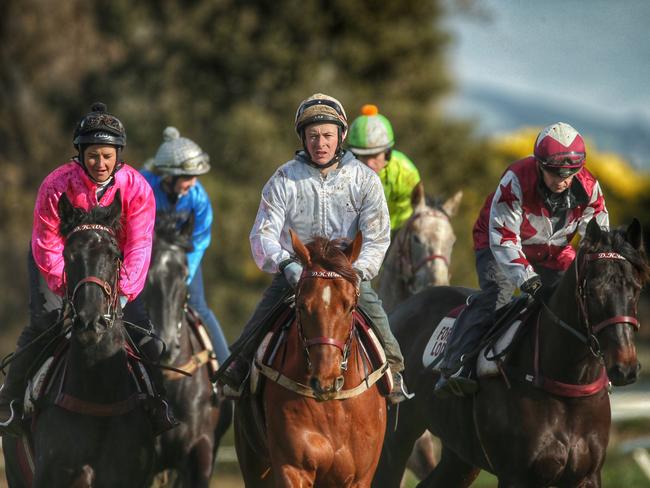


 People say to me, ‘It’ll eventually stop you’, but that’s not how I see it. Maybe that’s just me.
People say to me, ‘It’ll eventually stop you’, but that’s not how I see it. Maybe that’s just me.
